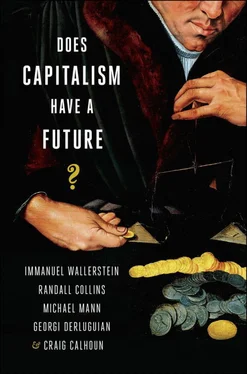Happily growth has also continued in much of Africa and in some of the emerging markets of Asia and Latin America. After years of being snubbed by the EU, Turkey now has a growth rate the envy of Europe though this doesn’t eliminate public discontent. But many economies throughout the world are, at best, unsettled and global capitalist expansion is close to stalled. This exposes as illusion the notion that the BRICs and other emerging markets would simply carry on capitalist expansion without interruption—or in other words, that the crisis was entirely local to the world’s richer economies. It was a global crisis and it is embedded in the globalization capitalism has helped to produce. That said, of course it did not have the same implications everywhere. The crisis speeded up the transfer of global economic power to China (and in varying degrees other “emerging” economies) that had begun as a dimension of the financialization of the world’s richer industrial economies. Ironically, this closed the gap between rich and poor countries more than the prodevelopment policies and assistance of the earlier decades of industrial boom. Long-term growth has not made China immune to the global downturn, and other BRICs have seen much greater volatility (like Russia) or sharper slowdowns (like Brazil).
Still, the bottom line is that capitalism is not likely to end as a result of any economic crisis alone. It is the intersection of economic with political crises that threatens it most, or the erosion of the implicit bargain in which people accept damages to society or environment in the pursuit of growth. Europe raises the specter of no growth capitalism—almost a contradiction in terms—and it’s not clear how it will cope. Asia seems still to offer growth, but in combination with volatile and vulnerable politics. And political unrest is recurrent, both where faltering growth brings disappointment to those with rising expectations and where elected leaders seek to diminish public freedoms and quash dissent.
Though the capitalist era has been shaped by the notion that an imagined pure economy could be sharply differentiated from state and civil society, capitalism itself has always been and must be produced in practices and organizations that cross those boundaries. The relationship between states and economic activity is constitutive, not incidental. Capitalism depends not only on the organization of markets as “objective” systemic phenomena but also on social and cultural constructions like the corporation—not just as a legal entity but as an organization of work. The expansion of capitalism has not only depended on states and societies, but on the exploitation of nature. In each of these three cases, capitalism is destructive of conditions on which capitalism depends—and extreme financialization and neoliberalism exacerbate this tendency. The future survival of capitalism depends on whether ways can be found to limit or reverse this destruction without eliminating capitalism.
One can feel transformation and renewal underway in much of Asia and parts of Africa and Latin America. High growth rates make for widespread optimism about a capitalist future and even encourage governments to join activists in declaring commitments to “green growth” and the building of better social support systems. The contrast with austerity-plagued Europe and the politically deadlocked and only slightly faster growing United States is palpable. Yet there is a crucial similarity despite differences of mood and trajectory.
Capitalist growth has imposed enormous costs in pollution, social upheaval, and inequality. The appropriation of disproportionate wealth by a capitalist elite is manifest, even flaunted, though so far enough others have shared in development to mute protest. Corruption adds a further challenge on top of inequality. At the same time, huge investments in infrastructure and resources are demanded, both for industry itself and to house rapidly urbanizing populations. These costs are largely externalized, while the new wealth is appropriated by those able to own, command salaries from, or tax capitalist profits. That is, the environmental and social costs are not borne by charges on corporate balance sheets; moreover, governments pick up much of the bill for needed infrastructural investments.
So is it over with capitalism? It depends on an “externalization regime” that enables its enterprises to rely on states, nonprofit organizations, and indeed families and ordinary people generally to bear the costs of both enabling conditions like infrastructure and damages inflicted as byproducts of capitalist growth. Indeed, much of capitalism’s profitability and growth depends on externalizing costs. Firms seldom pay in full for public investments from which they benefit—like health care, educating workers or building needed infrastructure. They produce pollution and waste but do not shoulder the financial, human, or natural costs of the damage. Capitalism generates terrific wealth, in other words, but it does it always with the byproduct of severe “illth” (to use the term coined by John Ruskin in polluted and poverty-stricken nineteenth-century England). It can continue to generate the wealth only as long as the illth is tolerated. States try to manage the tradeoff, but taxing capitalism adequately to pay for its own costs undercuts their international competitiveness and potentially eliminates capitalism’s very wealth-generating dynamism.
Capitalist enterprises also derive a number of other benefits from states, ranging from defense of their property claims to opportunities to harness for private commercialization the products of government-funded research. States provide needed inputs from currencies to roads and security in such matters as contract law. Capitalism also depends on social solidarity and a range of institutions from schools to health care. These often provide opportunities to profit, even when they are partially organized on public or nonprofit bases. But more basically, they provide services that enterprises would otherwise need to internalize and a stable context for business.
Indeed, even business corporations are not altogether contained within or controlled by capitalism as an economic system; they are legally structured, enmeshed in politics, and do work for their members beyond the profits for their owners. Corporate employment has been a major source of welfare benefits including pensions and health care insurance, though this has been in decline during the era of extreme financialization, as companies subject to disinvestment or takeover bids lost ability to plan for the long term and pared expenses to make their profitability more immediate to please fickle financial markets. Even more important in mitigating life’s risks—including those produced or intensified by capitalism—are governmental institutions from health to education to care for the aged and support for the unemployed. Many of these have been subjected to debilitating pressures during the era of financialization. At the same time, older institutions like family, community, and religious organizations are able to pick up only some of the additional burden. There are newly created nonprofit organizations founded both for self-help and as charities. For those with money to pay there are other approaches to managing risk, from insurance to savings. But as an economic system that inescapably produces risk and volatility capitalism depends on some structure of supporting institutions to help ordinary people cope. There has already been sharp erosion in socially organized mitigation of risks in long-standing capitalist economies and relatively slow development of new institutions for this purpose in emerging capitalist economies. This in turn raises questions about whether capitalism, and governments that support it, can sustain political legitimacy.
Читать дальше












